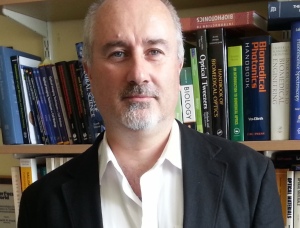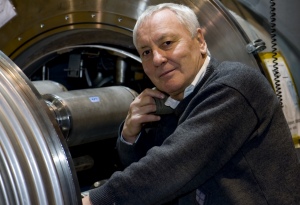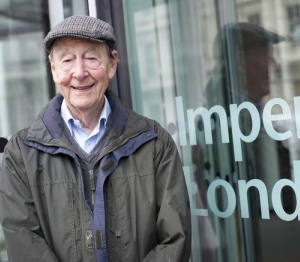Five Imperial physicists receive Institute of Physics accolades
by Mike Jones

Five leading academics from Imperial's Department of Physics are among the 2013 Institute of Physics award winners.
Among them is Professor Sir John Pendry, who received the Isaac Newton Medal for his outstanding contribution to Physics. His work exploring metamaterials has led to the possible development of invisibility cloaks, which has captured imaginations around the world.
Upon learning of the award, Sir John said: “It is very gratifying to have recognition for your work from your colleagues, particularly so in the case of the Newton Medal which has a distinguished list of previous awardees.” Among the past winners is Lord Martin Rees, the Astronomer Royal and former President of the Royal Society.
Professor Sir Peter Knight, IOP’s President, said: “In his illustrious career, John has revolutionised the way physicists think of materials and, in particular, the way materials react to light.
“His theories have inspired experimentalists around the world to design metamaterial devices, including, of course, the highly-anticipated invisibility cloak.”

Professor Paul French
Professor Paul French won a Joule Medal Subject Award ‘for his contributions to the development of Fluorescence Lifetime Imaging (FLIM) and its wide deployment from underpinning laboratory research to clinical application’. FLIM is becoming more commonly used in a number of biomedical applications and is now a routine technique for generating images of cell biology.
Professor Ed Hinds and Professor Lyndon Rees Evans received Gold Awards. Professor Evans, who is based at CERN, was awarded the Glazebrook Medal for his ‘outstanding leadership at the Large Hadron Collider’, while Professor Hinds won the 2013 Faraday Medal ‘for his innovative and seminal experimental investigations into ultra-cold atoms and molecules’.

Professor Lyndon Evans
Professor Hinds said: “When I started out in physics, I never thought at all about prizes or awards. I was just amazed and delighted that I could get paid for building experiments and playing in the lab - it still surprises me.

Professor Ed Hinds
“I have found the College a tremendously stimulating place to work for the last ten years because I am surrounded by so many world class colleagues and have access to excellent research students. Taking this together with the College's exceptionally strong support for research it is no surprise that we are doing well.”

Professor Tom Kibble
Theoretical physicist Professor Tom Kibble, whose 80th birthday was celebrated by a special event at Imperial earlier this year, becomes one of four new honorary fellows of the IoP for their exceptional service to Physics. His work in the 1960s helped begin forming the principles behind which the Higgs boson theory was developed.
In addition to those currently working at Imperial, two alumni also received awards. Professor Stephen Barnett (PhD Physics 1985), who is at the University of Strathclyde, won the Dirac Medal for oustanding contribution to theoretical, mathematical and computational physics, while Dr Andrew Shields (Physics 1985, PhD 1990) collected the Mott Medal for his research on semiconductors, fibre optics and quantum computing.
The full list of award winners, including early career, education and outreach awards, can be found at www.iop.org/awards
Adapted from the Institute of Physics press release.
Article text (excluding photos or graphics) © Imperial College London.
Photos and graphics subject to third party copyright used with permission or © Imperial College London.
Reporter
Mike Jones
Enterprise